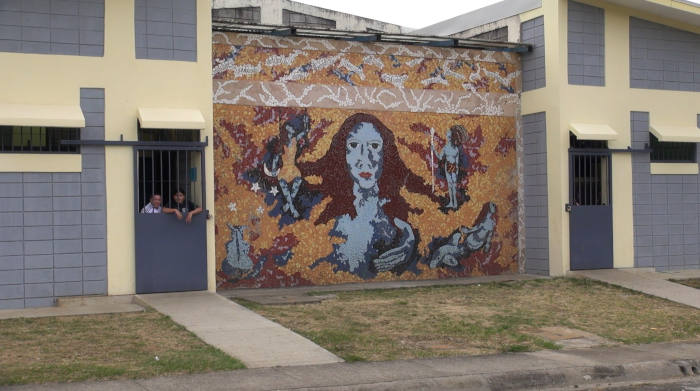-
14 March 2019
Category : Reportage
Guardian Angels
Laura Cárdenas is the author of this text and a EUROsociAL + expert in the development of an awareness strategy for alternative measures to prison
 Photograph of a prison in Latin America
Photograph of a prison in Latin AmericaJust like every week, Miguel comes to PROMESEM, the Social and Community Insertion Program of the National Institute of Social Inclusion of Adolescents Uruguay (INISA). Every day psychologists, social educators, professors and teachers await to work closely with him and to comply with the sanction imposed by the court for the crime he committed, after a year of confinement, now in an open environment. “They are my guardian angels,” he explains. And that is the atmosphere in the INISA centre. Hugs, smiles, the smell of incense, decorated walls and teenagers, men and women, who are looking for encouragement and a way to make up for the damage they caused, to society and to themselves.
Miguel is one of more than 300 teenagers who are under the protection of INISA, the governing body in charge of young people guilty of criminal conduct, within a system in which imprisonment “has been the rule rather than the exception”, according to its president, Gabriela Fulco. That is why the State has created a new model for addressing non-custodial measures that “responds to the need to comply with the commitment acquired by the State on ratifying the Convention on the Rights of the Child ” and implies more extensive application of socio-educational and reintegration measures, facilitating the continuity of the social and family lives of teenagers and establishing peace within the community.
Because of this, the European Union, through its EUROsociAL + programme, which is managed by the FIIAPP, is assisting INISA in this process by exchanging experiences and good practices in European and Latin American public policies in this area. These include designing a communication and awareness-raising strategy to serve as a guide to raise awareness among Uruguay’s citizens, state institutions, media and private sector of the need to promote the application of measures other than imprisonment to improve social cohesion.
As explained by Fulco, from the perspective of both children’s rights and citizen security, imprisonment does not solve the problem of insecurity or improve the possibilities of social reintegration of teenagers. However, the model that applies alternative sanctions to imprisonment through socio-educational measures has demonstrated internationally lower rates of recidivism and greater reintegration.
Integral work
PROMESEN serves teenagers who have previously been imprisoned and others who have not . According to its director, Fernanda Albistur, there is a big difference between them: “Those who come after being incarcerated are stunned, during the initial weeks they do not even want to leave the house and many are afraid to come alone. They keep hearing the noises of the prison, the padlocks, the doors … It is much more difficult to get them to participate in the programme. Confinement also aggravates the family situation and all the conflicts they had prior to their detention and that were frozen reappear, “explains Albistur. “We often ask ourselves what we can do to repair the institutional damage caused by confinement, what we can do to repair the horrible experiences they have had.”
Miguel went every week to the geriatric hospital Piñeiro del Campo, where elderly homeless people live, as part of one of the community service programmes the socio-educational sanction requires.
Laura Berois, a teacher, accompanied the teenagers in this activity. “They have very complex lives and when faced with situations more difficult than theirs they become aware of how important it is to look after themselves,” she says.
Mariela, who also participates in this programme, lives with her parents and grandparents in a neighbourhood that she does not like, she explains. Now Mariela says that she has realised that “it is useless to take the easy way. You have to fight and live peacefully with other human beings . ” Mariela imagines a future in which she can continue with her studies “to work and bring up my family because I want to be a nurse to be able to heal people”. “I still have two months left to keep coming, but I’m going to do it. In addition, there are good people here, they help us “, she emphasises.
Sofia Rodríguez is one of the PROMESEM educators. Every day, she faces the challenging task of seeing the conditions in which the teenagers live. Their basic needs and rights have been totally violated which is why “they care so little about their own lives”. They are teenagers who are totally excluded from society, from the education system, who are born and live in a criminal environment, which is why Sofia asks: “How can they be expected to respect the rights of others if all their own rights have been totally violated? Nobody questions why adolescents in trouble with the law do not belong to the middle or upper classes, but to the poor. As a society, we are responsible for what is happening”, she insists.
“ Most have been neglected throughout their lives . Some have serious psychological disorders and cannot distinguish between right and wrong”, explains Carolina, one of the centre’s psychologists. However, all the workers at the centre praise these teenagers’ resilience.
“I have never been treated as well as at Piñeiro Hospital. What’s more, the old people were always waiting for us and when we left they were sad. We did art together and even did an exhibition of the works at Santo Domingo City Hall”, says Miguel. Now, Miguel, thanks to the agreement between the Municipality of Montevideo and INISA and, above all, to his change of attitude, has found a job and will be able to meet the needs of his newborn son and those of his family.
The views and opinions expressed in this blog are the sole responsibility of the person who write them.




